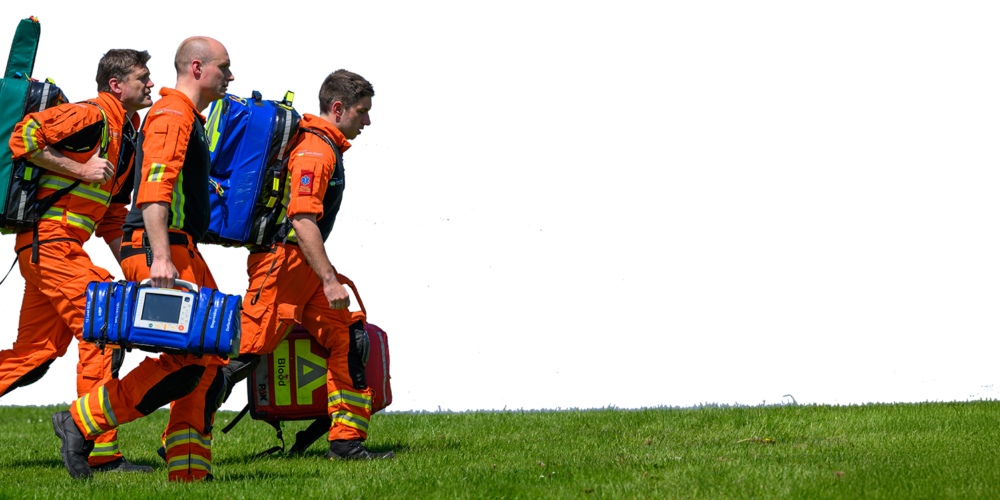
Sustainability
Our commitment to the environment
At Great Western Air Ambulance Charity, we take our responsibility to protect the environment seriously. We've set ourselves a target to be carbon neutral by 2030, and we're working hard to achieve this.
This is challenging, as we need to ensure that we can continue to save lives and keep families together for longer. Our work relies on a helicopter, critical care cars, advanced medical equipment and drugs. The technology isn't available yet to effectively replace our vehicles with more environmentally friendly versions, or to eliminate single use plastics in a clinical environment.

Natural Environment
Extensive planting and gentle management of the land around our airbase has increased biodiversity and created a wonderful habitat for deer, rabbits and other indigenous wildlife.


Recycling
- We have a growing network of high street shops, which save thousands of tonnes of goods from going to landfill each year.
- Dozens of textile recycling banks encourage people to recycle clothing and other textiles in convenient locations.
- We offer a recycling scheme for stamps.
- We encourage and provide facilities for extensive recycling at all our sites.
Travel
- We have been awarded Gold in the Cycling Friendly Employer evaluation by Cycling UK due to our extensive work to encourage cycling to and for work.
- We operate pool cars and an ebike to reduce the need for staff to drive to work.
- We have EV charging points at our airbase, for use by staff, crew and visitors.
- Our travel policies encourage lift sharing, use of public transport and discourage flying.
- We operate the helicopter only during times and for incidents where it is needed, and after 7pm always use our critical care cars instead. At night these are usually as effective as the helicopter due to less traffic being on the roads and the restrictions on helicopter flying in the hours of darkness.
- We are working in partnership with our helicopter operator, Babcock, and organisations such as Vertical Aerospace to ensure that if and when more environmentally friendly aircraft become suitable for our work, we will be at the forefront.

Procurement
- We are alert to unsubstantiated claims about the sustainability of products and conduct our own research where needed.
- Our office furniture is almost exclusively second hand and donated, and we seek to buy second hand goods and equipment wherever this is practical (excluding clinical equipment).
- We purchase items made from recycled materials wherever this is feasible and not cost-prohibitive.
- Unlike other charity retail chains, we do not buy in new goods for sale (with the exception of GWAAC branded goods).
- We think being green can also be fun, and each year our Secret Santa insists that all gifts have to be homemade, second hand or re-gifted!
- We provide vegan alternatives to meat and dairy.
- We partner with local suppliers wherever practical, such as Wogan Coffee, Clifton Chilli Club, Doveton Press, KN Office and Clifton Canvas


Energy use
- The energy for our airbase and shops comes from 100% renewable sources.
- Our airbase roof is covered with enough solar panels to power making 10 million cups of tea a year, through a partnership with Bristol Energy Cooperative.
- Our rooftop solar panels will cut annual energy bills by around £7,500. We'll be able to use the money we save on energy to help more people in urgent need of lifesaving care.
- During 2023, a specialist company audited our energy use at the airbase and we are implementing the recommendations.
- We are working with Bristol Energy Cooperative to create a 5MW solar farm at our airbase. We hope to secure planning permission and start the works in 2026.
We always welcome challenge, ideas and opportunities to improve our performance in these areas, so please get in touch if you can help us become even greener (no sales please!).
If you would like more detail or have some specific questions, please see our FAQs below.
Frequently asked questions

"Working for an ethical organisation is incredibly important to me and the rest of the team, and being an environmentally friendly and sustainable organisation is a key element of this.
I am proud that we have and will continue to make meaningful progress in this area, demonstrating that any organisation can make a difference, regardless of their area of operation or level of resources."
- Anna Perry GWAAC CEO


